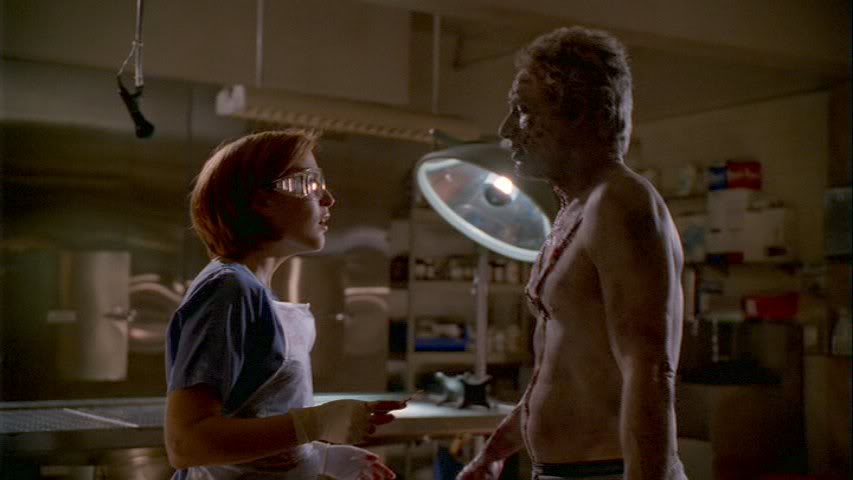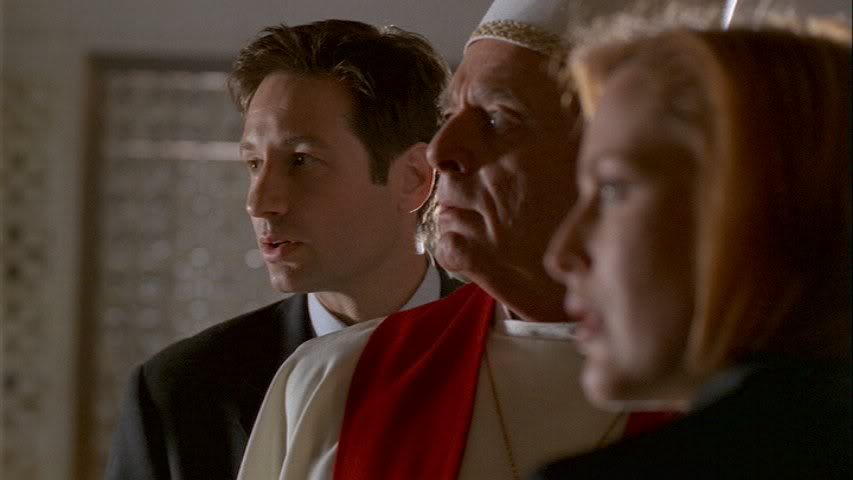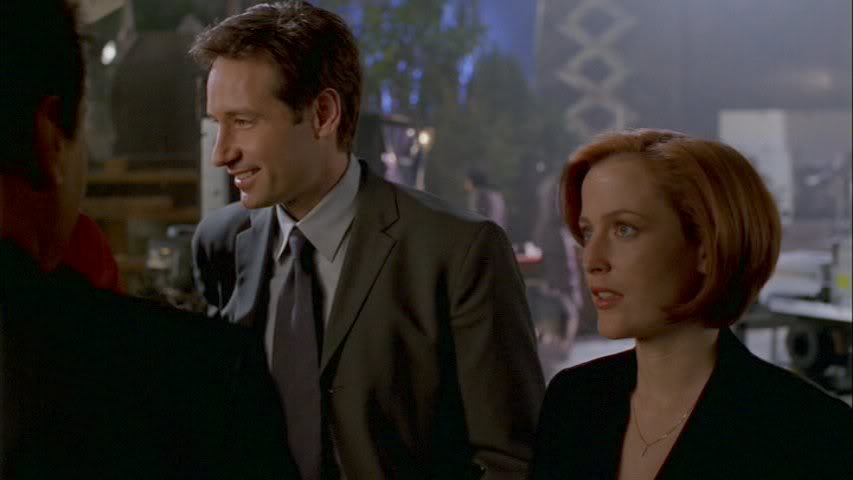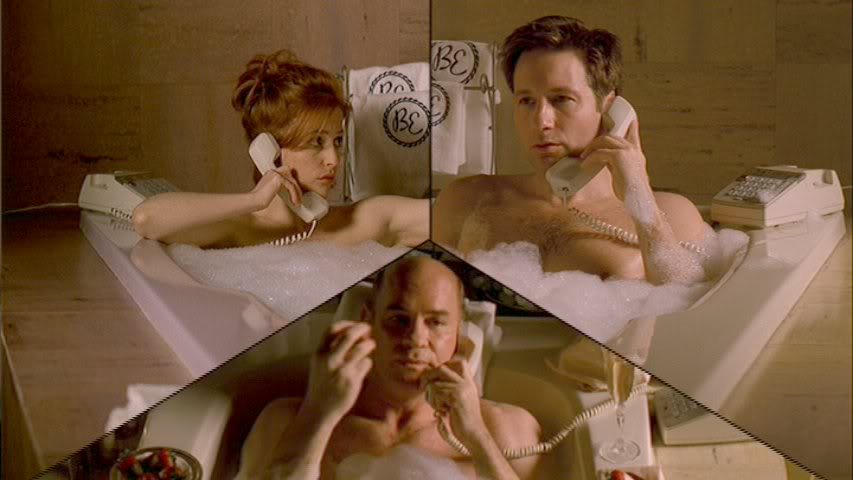CTP Episode of the Day - 05.30.06
Today's Cherished Episode: Hollywood A.D. (7X18)
Original Air Date: April 30, 2000
Written and Directed By: David Duchovny
An X-File becomes the plot of a Hollywood movie; but Mulder and Scully find their case -- and themselves -- distorted on the big screen.




(Thanks to chrisnu for today's episode pics.)
CARDINAL O'FALLON: Is being made a fool of a crime, Agent Mulder?
MULDER: I'd be doing life if it were, sir.
Some "Hollywood A.D." Tidbits & Musings:
-- The "A.D." in the title "Hollywood A.D." references "Assistant Director" Skinner, who has pitched an XF story to his friend, a Hollywood director. But since much of the story also references religion and Christ, the A.D. probably also refers to "Anno Domini," Latin for "the year of our Lord" and our designation for the time after Christ (A.D.), as opposed to B.C., the time before Christ.
-- During Season 7, David Duchovny came to Frank Spotnitz and said he had an idea for an X-File episode. Spotnitz recalls they talked about it a bit, they gave DD the green light, and before he knew it, Duchovny had returned with the script. Double D was handed the directing reins as well, and "Hollywood A.D." was born.
-- "I thought David wrote a smart, intelligent, quirky, and complex idea," Chris Carter said. "I thought it was outside the norm, even for The X-Files, and it showed how the show could stretch in a completely new and different direction.
-- Casting Director Rick Millikan said that there weren't many roles to cast, because Duchovny knew exactly who he wanted in the roles. For the movie-within-the-show, he thought it would be clever to cast his wife Téa Leoni and his best friend Garry Shandling in the roles of Scully and Mulder, and keeping it "all in the family," even dog Blue got a walk-on role. Blue can be seen wandering on the set when Mulder and Scully meet Shandling and Leoni, and when Scully is showing Leoni how to run in heels.
-- Duchovny tapped friends Minnie Driver and David Alan Grier, his co-stars in Return to Me, to be in the audience at the movie premiere. Also in the audience was Chris Carter, making his second on-camera appearance on The X-Files. (The first was in "Anasazi.") DD's double Steve Kiziak is supposed to be Téa Leoni's date (e.g., David Duchovny) in the audience scene, but I don't think he's visible on camera.
-- DD wrote the role of Wayne Federman for his friend LA-based comedian, actor, and writer ... Wayne Federman. Federman appears regularly on The Tonight Show and does a lot of voice work on the Cartoon Network, Nick at Night, and in the Florida Orange Juice commercials, where he provides the voice of the talking "ham and cheese" sandwich.
-- One of the roles that was cast was actor Harris Yulin as Cardinal O'Fallon. Yulin had a recurring role on Buffy the Vampire Slayer as the elder Watcher, and more recently had a recurring role on 24.
-- Duchovny also thought it would be appropriately surreal to cast the behind-the-scenes XF technical crew in several key sequences, including the premiere of the movie "The Lazarus Bowl" and the sequence where the movie is being filmed. Appearing for the first time on camera were: company grip Richard Deats, the guy on the bike with a donut; DD's Assistant Kevin Cooper as the production assistant who leads M&S to meet Wayne; craft services person Tina M. Ameduri playing Tina the craft services woman; director of photography Bill Roe as the food phobic zombie; assistant director Barry K. "Sugar Bear" Thomas as Sugar Bear (the guy with the megaphone); producer Paul Rabwin as a producer schmoozing a chorus girl; visual effects coordinator Bill Millar as the film's director (doing his best "let's kick it in the ass" impression of Kim Manners); and David's brother Danny Duchovny as an assistant director.
-- The names on the tombstones in the teaser are actual names of obscure, deceased directors specially chosen by Duchovny from the FOX archives. The most notable one was the name "Alan Smithee," a notorious pseudonym used by Hollywood directors when they want to "disown" a film. The Directors Guild contract does not permit a director to remove his or her name from a film -- the only exception being when a movie has clearly been taken away from a director and heavily recut against his/her wishes in ways that completely alter the film. Directors can appeal to the Guild in those cases, and if the appeal is successful, their name is removed and replaced with the name "Alan Smithee." Quite clever and appropriate that Mulder (Shandling) was shown hiding behind this stone.
-- The line said by Movie!Mulder in the teaser, that he would "rather serve in Heaven than rule in Hell," is a reference to Milton's Paradise Lost in which Satan says, "Better to reign in Hell than serve in Heaven."
-- DD included some personal "in-jokes" in the script, including Scully's line that Leoni liked Mulder and Shandling liked him too -- a reference to DD's appearances on The Larry Sanders Show playing himself, but with a crush on Shandling. Another real-life reference was Mulder's request to be played by Richard Gere. When the XF was taking off and Duchovny was thrust into the limelight, a few magazines started dubbing David as a "young Richard Gere" or a Gere look-alike. During one of his hosting stints on Saturday Night Live David played a person impersonating Richard Gere.
-- Scully is described as "Jodie Foster's foster child on a Payless budget," referencing the fact that Scully was originally modeled on Foster's character from Silence of the Lambs.
-- Mulder is described as a "Jehovah's Witness meets Harrison Ford's Witness" -- the question that DD missed on his appearance on a celebrity edition of Who Wants to Be a Millionaire was regarding a line from the film Witness.
-- Mulder's line, "Sir, have I pissed you off in a way that's more than normal?" probably would have been a lot funnier had we not just seen Mulder use the same sort of line in "Chimera" a few weeks before.
-- When Wayne Federman is talking to Mulder and Scully about observing them, he tells them, "I'll be strictly Heisenbergian -- like a hologram." Werner Karl Heisenberg was a German physicist and a founder of quantum mechanics, winning a Nobel Prize in 1932 for his uncertainty principle, which states, in effect, that it is impossible to observe something without changing it. Reportedly, during his college days, Duchovny was fascinated by Heisenberg's principle; and in fact, a chapter in the Unauthorized Biography of DD is titled "The Heisenberg Principle." The book speculates that the principle took on greater significance to DD after the XF made him famous, because he became the object observed and felt that being watched by fans and hounded by journalists was changing him. Federman uses the quote in the wrong context, probably why Mulder gives Scully the pained expression.
-- In the scene where Mulder and Federman pull up in front of the church, Federman is saying, "I was just curious if she's more than your partner" to which Mulder says, "Enough, Wayne." Interestingly, the Official Season 7 Guide says Mulder replies "firmly": "No, Wayne." (This scene does not appear in the original script.)
-- It was kind of odd that the cell phone on the body saying "Micah Hoffman" in the caller ID window was used to identify the body, especially since the window shows who is calling, not who the phone belongs to.
-- The character of Micah Hoffman is based on Mark Hoffman, who in the 1980s was a master forger who created documents that cast doubt on the origin of the Church of Jesus Christ of Latter Day Saints - the Mormons. Most famous of these was the Salamander Letter that described how the Golden Plates from which the Book of Mormon was translated were found. Mormon leaders bought the story detailed in the letter hook, line, and sinker, but some of Hoffman's accomplices threatened to expose him and so he made plans to eliminate them courtesy of his homemade bombs. Unfortunately for him, one of his bombs exploded prematurely injuring him in the process, and the subsequent investigation uncovered many of his forgeries, including the Salamander Letter, causing great embarrassment to the church.
-- One thing I found most interesting about this episode was DD's choice of three individuals (the "Holy Trinity") who might have influenced Fox Mulder, thereby helping to make him the man he became. The choice of Frank Serpico seems pretty obvious - a renegade cop who risked everything and became an outcast among his peers because he sought to expose the truth. Willie Mays - the "Say Hey" Kid, perhaps chosen because Mulder would admire someone who not only played the game with enthusiasm and exuberance but who was also a great all-around player, mastering the five fundamentals of the game (though it's perhaps a bit unlikely that Yankee-loving Mulder would choose a Brooklyn Dodger). Micah Hoffman -- a "60s radical" -- is again probably someone Mulder would admire as a person who followed his own path, a brilliant scholar and accomplished athlete who wasn't afraid to toss aside "conventional wisdom" to explore extreme possibilities.
-- The "Weathermen" were a group of 60s radicals who wanted their people to get involved, demonstrate, get arrested, and force change down the throat of the establishment. They took their name from a line in the Bob Dylan song, "Subterranean Homesick Blues," (a line which Wayne quotes later in this episode): "You don't need a weatherman to know which way the wind blows."
-- Altamont refers to the culmination of the Rolling Stones tour of 1969: a free concert at Altamont Speedway which turned into one of the largest rock disasters ever. If "Woodstock" denotes the flowering of one phase of the youth culture, "Altamont" has come to mean the end of it. Four people died in the violence that erupted there. (On a lighter note, and one that has another XF connection, the live album that was produced in conjunction with the Stones' 1969 tour was titled, "Get Yer Ya-Ya's Out.")
-- "The Dharma Bums" is a book by Jack Kerouac published in 1958. "Dharma" is one of the most important words in the Hindu and Buddhist religions. It basically means "your spiritual duty," or "your place in the universe" (sound familiar Lost fans?). A Dharma Bum is a bum because it is the right thing for him to be, because by being a bum he is fulfilling a spiritual duty greater than himself.
-- Chuck Burks' line, "There's music in the air," was a popular catchphrase from Twin Peaks, DD's first TV series. Speaking of Chuck, a line in DD's original script had Chuck saying to Scully, "I can see why Mulder digs you." Too bad that didn't make the final cut!
-- In the scene where Mulder asks Federman who's playing Skinner in the movie (to which Federman replies "Richard Gere"), the original script includes the line, "You know why we called him Skinman in college, don't you?"
-- Hoffman's corpse says to Scully, "Noli me tangere, baby" which means "Touch me not ... baby." This is taken from John 20:17 and is what Jesus said to Mary Magdalene when he appeared to her at his tomb. "Touch me not, for I am not yet ascended to my father."
-- Oopsie! When Scully is alone performing the autopsy on Micah Hoffman a shadow can be seen on the wall behind her. As the scene ends with her staring at her cut finger you can see a person's shadow cross the wall behind her from left to right.
-- Anyone who's seen the outtakes of this episode knows that Director David Duchovny will do whatever it takes to get the reaction he wants from his star (when he tells her that Téa Leoni is going to play her in the movie! -- There has been speculation that in the autopsy scene where Micah Hoffman comes to life and starts talking to Scully, that it's actually DD playing Hoffman (see photo above). There is a definite resemblance (especially with the makeup), and given the nature of the episode and the fact that it's a hallucination on Scully's part, I suppose it's remotely plausible, but it's never been proven. It's been similarly speculated but never proven that in the final dance scene, DD and wife Téa are one of the dancing zombie couples.
-- Scully's vision of Micah Hoffman as Jesus on the cross says to her "Consummatum est," which means, "It is finished" (John 19:30), Jesus' final words.
-- In the scene where M&S meet with Micah Hoffman (after Skinner tells them they are off the case), there's a bit more to the scene in the original script. In the final version, the scene ends after Hoffman tells the duo that "God works in mysterious ways." But in the original script, M&S prepare to leave, Mulder and Hoffman shake hands, but Hoffman doesn't let go. Then he says: "I know you think I've gone insane, but anyone who has seen the truth is seen to be insane. You know that so well, Fox. And you Dana ... since you used your faith like a knife to cut out my heart, it is with you that I leave my heart for safekeeping." I'm kind of sorry they cut that.
-- Mulder lives in Apartment 42 and he's seen the movie Plan 9 from Outer Space 42 times. According to The Hitchhiker's Guide to the Galaxy, the number "42" is The Answer to the Great Question of Life, the Universe, and Everything.
-- Often considered the worst movie of all time, Plan 9 from Outer Space concerns the resurrection of the dead by space aliens. The aliens, led by Ruler, are trying to stop Humans from developing Solaranite -- an explosive that would ignite particles of sunlight. ("Ignite the sunlight here, gentlemen, and you ignite the sunlight everywhere!") The previous 8 plans had failed; hence the "Plan 9" of the title. The film was made by Ed Wood, Jr., a transvestite visionary who really and inexplicably believed in his terrible product. The continuity is shredded, the tombstones are made of cardboard and bend on-camera, and the dialogue is howlingly bad. The film's star, Bela Lugosi, died before primary shooting was finished; so Wood intercut two minutes of home movie footage with a clever substitution -- a skull double; the rest of the man looked nothing like Lugosi, so through the rest of the film the double walked around with his cape wrapped around his face.
-- There's an obvious dubbing flub in the scene where Scully says to Mulder "You've seen this movie 42 times?" Mulder replies "yes" but his lips say something else. The original script offers no hint, as Mulder doesn't reply before Scully says, "Doesn't that make you sad? It makes me sad." (But the direction in the original script says, "And then it does, it does make him sad to be such a loser.")
-- When M&S meet Federman on the movie set, he kisses Mulder on the cheek and shakes hands with Scully. The original script direction says that Federman "kisses them both on the cheek, LA man style."
-- The split screen bathtub scene is an homage to the film Pillow Talk. During the scene, Scully's talk about sexual fears and desires seems to have Mulder searching for his rudder, so to speak (although his hand doesn't surface when he's talking to Skinner either). Scully uses the time she's on hold to play with her nose, so no wonder it took so long to get those two crazy kids together. (But in the original script, DD's description of the scene says "their toes look like they're touching." Awwwwwww.)
-- Have you noticed that Scully only *really* giggles in episodes penned by David Duchovny?
-- Mulder in a tux and no Phoebe or Diana in sight! Woo-hoo!
-- It is definitely DD's stand-in Steve Kiziak (and possibly GA's stand-in Arlene Pileggi) in the final shot of Mulder and Scully walking off hand-in-hand into the special effects green screen (with their Bureau credit card).
-- DD came to Paul Rabwin before filming was completed because he wanted to use a musical track from the film The Buena Vista Social Club for the sequence where the zombies come out and dance. Rabwin had trouble licensing the music, so he asked Mark Snow to create an original piece of music for the scene.
-- The zombie dance sequence required two days of actual shooting. They shot some of it during the actual day of production and then scheduled an additional Saturday to accommodate the bluescreen work that was required for the scene.
-- Mitch Pileggi really enjoyed the scenes that Duchovny wrote for Skinner in this episode; and Gillian Anderson remembered, "It was a lot of fun on the set, especially with Téa and Garry around. David is always good to work with. He knew exactly what he wanted and went for it."
-- In comparing DD's efforts, I preferred "The Unnatural" mostly for its sweetness and charm. Where "The Unnatural's" humor was subtle and underplayed, "HAD" went for hip-ness and bigger laughs, and sometimes I felt like the "in-jokes" got in the way. There was more M&S interaction in "HAD," which was nice, but the limited scenes between M&S in "TU" were a shipper's dream! I do think that "HAD" said a lot about DD's feelings about The X-Files, Mulder and Scully and the entertainment industry, and also perhaps a bit about his ambivalence about leaving the character of Mulder behind. But I still enjoyed "HAD" a lot. One regret for the series is that we didn't see DD sink his teeth into writing and directing a serious episode. His story ideas and contributions to the mytharc over seven seasons make me sure that he would have done a bang-up job.
-- And DD's final notes on the original script: "And now by the magic of Bill Millar & Co., the GREEN SCREEN becomes the rest of a HUGE GRAVEYARD with corpses dancing stately and dignified upon it as we begin a slow pull out to a heavenly perspective ... This is what life's all about. This is what the dead would do if only they could. As we slowly fade to black, the band plays on. And we end."
Please share your first impressions, favorite (or cringe-worthy!) moments, classic lines, favorite fanfic, nagging questions, repeated viewing observations, etc., as today we celebrate "Hollywood A.D."!
Polly